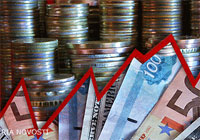TRANSCRIPT: [Putin] Meeting with the Government [re: economic development]

(Kremlin.ru – February 12, 2014)
Vladimir Putin met with a number of Government members to discuss legislation for developing Russia’s financial market and implementation of the Economic Development Ministry’s 2013-2018 action plan.
The meeting continues a series of consultations that the President is holding with the Government on carrying out the tasks set out in the Annual Presidential Address to the Federal Assembly, which follow from the May 2012 presidential executive orders.
PRESIDENT OF RUSSIA VLADIMIR PUTIN: Good afternoon, colleagues.
On the agenda today we have the implementation of the Economic Development Ministry’s 2013-2018 action plan, and the question of laws and regulations needed for developing Russia’s financial market.
But before we start work, I want to say to Mr Ulyukayev [Minister of Economic Development] that I would like to hear how the work on preparing the long-term macroeconomic forecast is going. This is something we have discussed on many occasions, taking into account the developments unfolding in the global and Russian economies.
There is probably no need to repeat what we all agree on, namely, that previous growth sources have either exhausted themselves or no longer produce the kind of results they used to. We were always hoping for continued increase in energy prices, and energy prices are at a good level, but we do not have the same kind of growth as in the past, and we could say that this source has now exhausted itself. We have spoken often about our reserves too. I would like to hear from you in more detail on their situation today: how does the Ministry view these reserves, and what is the situation with drafting measures to raise labour productivity and resolve the problems of single-industry towns and closed towns. The situation with some of the latter is particularly worrying because these towns are similar to the single-industry towns but have the added limitations that their restricted-access status imposes on them. They face quite a lot of problems.
I also ask you to say a few words on the creation of an integrated export support system, including access to loans, insurance, and the establishment of the relevant organisations. We discussed the need to promote Russia’s economic interests abroad through our trade offices, and your last two predecessors at the Ministry worked on reviving these trade offices and giving their work a new boost. What is happening in this area now?
Another big priority is to establish a single registration system by merging the Unified State Register of Real Estate Property Rights and Transactions and the State Real Estate Cadastre. We must complete the inventory of real estate valuation and move over to cadastre-based valuation for tax purposes. This is a sensitive issue for property owners of course, but it is very important and I ask you to give it your attention.
Finally, there is the question of providing state and municipal property rights registration and real estate cadastre registration services through an extensive network of multifunctional centres. Active efforts are already underway to establish this network. I would like to hear on how this work is going too.
Before we turn to the main item on our agenda today, I want to note that I met with the Public Council in Sochi and they raised many questions about the city’s future development. One of their questions was about Sochi’s possible participation in our domestic tourism development programme. I told them straight out that it probably does not make sense to include Sochi in this programme because its funds are earmarked primarily for infrastructure development: roads, bridges, hotels, etc. Sochi has enough of all this now, for the present at least. But this does not mean that we should not develop the city as a major Russian holiday and sport resort. We therefore need to reflect on how to organise things so that Sochi can take part in other development programmes, including programmes to support healthcare, education, sports development and so on.
I would like to hear a few words on all of these matters, and I ask Mr Shuvalov [First Deputy Prime Minister] to brief us on the situation with small and medium business, taking into account the state support measures. The number of individual entrepreneurs is still falling, unfortunately. We have not yet reversed the trend. I know that the Government has made a number of decisions on this issue and that draft laws have already been submitted to the State Duma.
<…>
